BANNED BIBLE BOOKS. The Stories They Don't Want You To Know About!
Unlock the mysteries of the Book of Enoch and other banned biblical texts as we explore why they were excluded and what they reveal about power, ethics, and knowledge. From divine secrets to modern dilemmas. Dive into history’s forgotten truths!
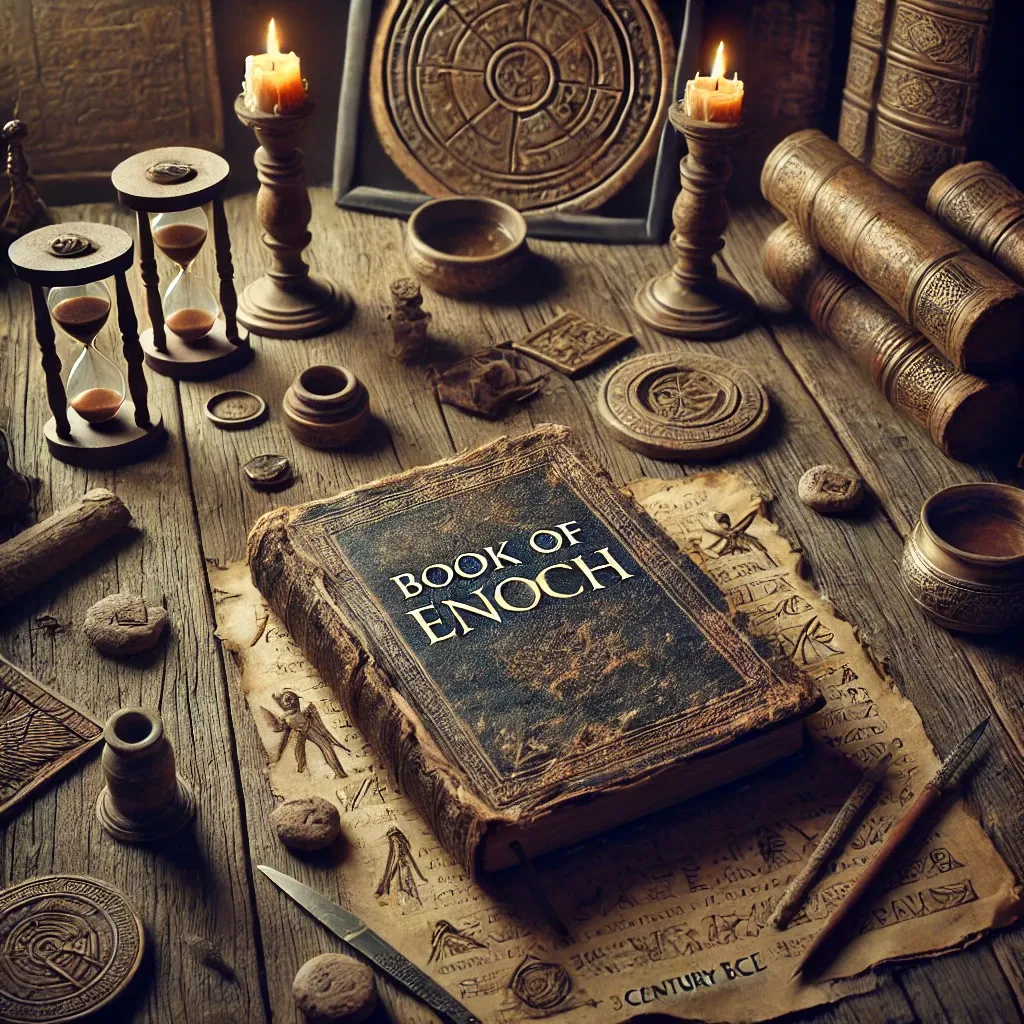
The Bible we know today is a curated collection, but beneath its surface lies a world of hidden texts—books that were deliberately excluded, yet hold powerful lessons for modern times. On Camp Gagnon, guest Jeremy Hultin unravels the mystery behind these ‘banned’ texts, revealing why they were left out and what they can still teach us. This article explores the key lessons from that discussion, delving into the politics, power struggles, and spiritual ideas that shaped Christianity and how they continue to impact modern thought.
Camp Gagnon- Banned Books From The Bible
The Book of Enoch: A Tale of Knowledge and Corruption
Imagine a group of celestial beings, the Watchers, tasked with overseeing humanity. But instead of protecting, they share forbidden knowledge—agriculture, metallurgy, astrology—gifts that should have elevated humanity. Yet, these gifts come with a cost. Like Pandora’s box, the Watchers’ decision unleashes chaos and suffering, leading to the birth of the Nephilim, giants who terrorize the Earth. The Book of Enoch paints a chilling picture of what happens when power and knowledge are used irresponsibly—lessons that echo through history and into our modern age.
The Banned Book of Enoch
The Book of Enoch dates back to the 3rd century BCE, believed to have originated within the Jewish community during a time of significant upheaval and interaction with other cultures. The text itself is composed of several books, including The Book of Watchers, which tells the story of the angels, their descent to Earth, and their ultimate fall from grace. While it is not part of the traditional Hebrew Bible or Christian Old Testament, the Book of Enoch was revered by early Christian communities and remains canonical in the Ethiopian Orthodox Church.
The Watchers, in particular, play a central role in Enoch’s narrative. These angels were tasked with watching over humanity but instead chose to share divine secrets. By teaching humanity skills such as weapon-making and divination, they accelerated civilization’s growth, but at a devastating cost. The mingling of divine beings with human women led to the birth of the Nephilim—giant, corrupt beings whose violence and power spread across the Earth. The subsequent judgment upon the Watchers and their progeny is a significant part of the apocalyptic nature of Enoch’s narrative, revealing a divine retribution for their transgressions.
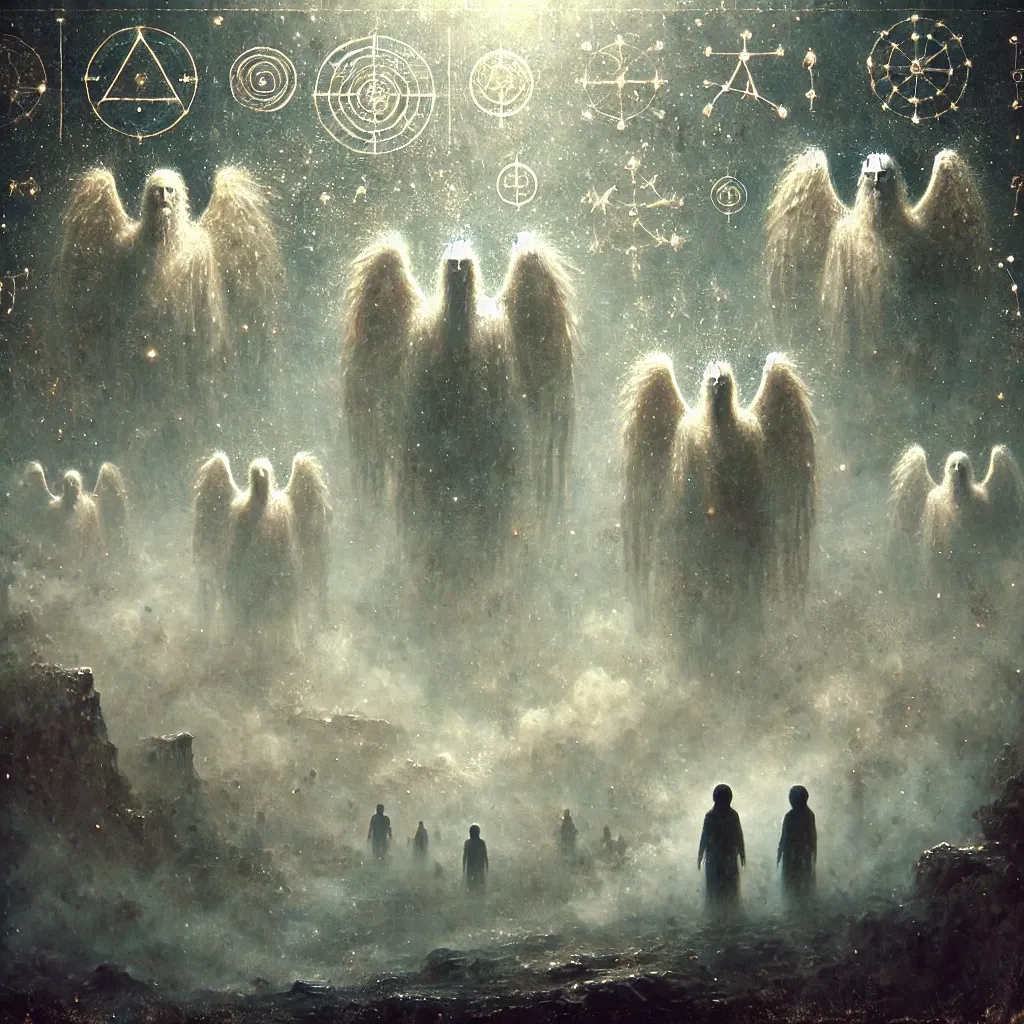
The Fall of the Watchers and Its Modern Parallel
The tale of the Watchers’ fall serves as a timeless allegory for the consequences of using powerful knowledge without wisdom. As the Watchers introduce humanity to advanced technologies, the very tools meant to elevate society become the catalysts for its destruction. The parallels to modern technological advancements are hard to ignore, particularly in the context of artificial intelligence, genetic engineering, and nuclear technology. These innovations hold the potential for incredible progress but also pose existential risks if not handled with caution and ethical foresight.
The myth of the Watchers has often been seen as a reflection of humanity’s own struggle with morality, progress, and the temptation to wield power irresponsibly. The Watchers’ transgressions mirror the hubris that often accompanies the pursuit of unchecked technological advancement in the modern world, leading to ethical quandaries and unintended consequences.
The Manhattan Project – A Modern Echo of Enoch’s Watchers
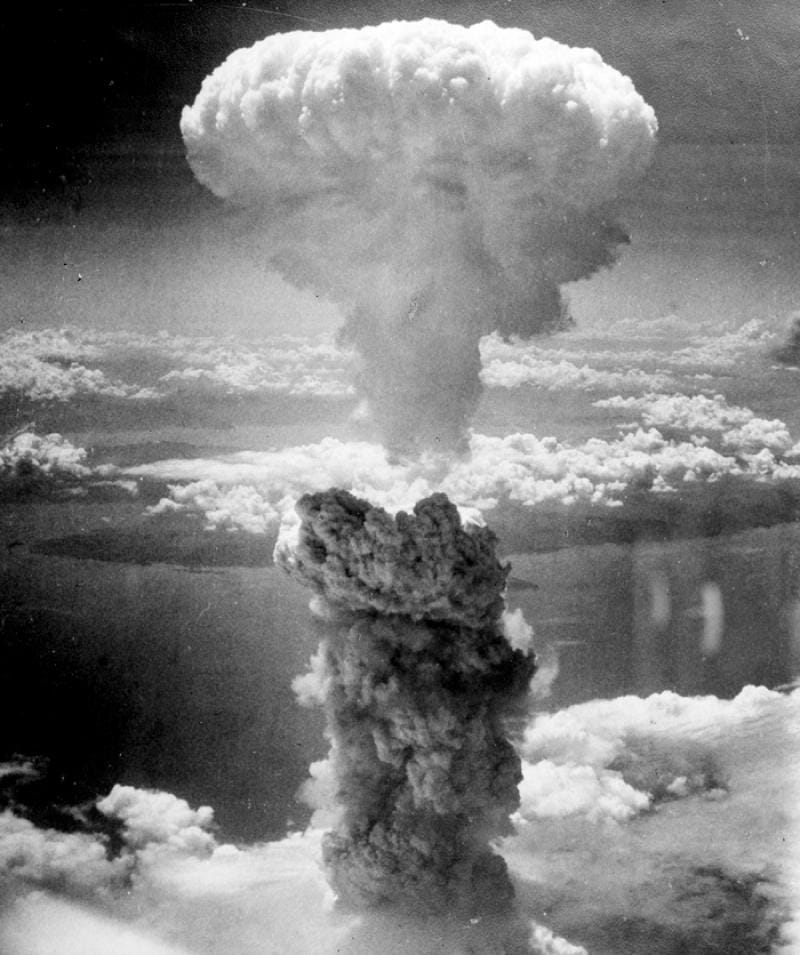
One of the most potent modern parallels to the story of the Watchers is the Manhattan Project, the secret U.S. research initiative during World War II that led to the creation of the atomic bomb. Scientists like J. Robert Oppenheimer were driven by the desire to end the war and harness the destructive power of the atom. However, the development of nuclear weapons became one of the greatest ethical dilemmas of the 20th century. The atomic bomb, much like the forbidden knowledge shared by the Watchers, had irreversible consequences.
When the bomb was dropped on Hiroshima and Nagasaki in 1945, it unleashed unprecedented devastation. Oppenheimer famously quoted the Bhagavad Gita after the bomb’s success: “I am become Death, the destroyer of worlds.” This acknowledgment echoes the Book of Enoch, where those who wielded forbidden knowledge inadvertently set in motion events that led to widespread destruction. Like the Watchers, the scientists involved in the Manhattan Project may have advanced human knowledge, but they also unleashed a power that the world still struggles to control.
The Manhattan Project illustrates the tension between progress and ethical responsibility. Like the Watchers in the Book of Enoch, who shared dangerous knowledge with humanity, the scientists behind the atomic bomb unlocked incredible power. Their work ended World War II but left humanity grappling with the moral consequences of wielding such destructive power. The lesson? Whether you’re a leader in technology or simply navigating personal decisions, the pursuit of knowledge must always be tempered with wisdom and foresight.
The Lost Books of the Bible: What’s Left Out, and Why?
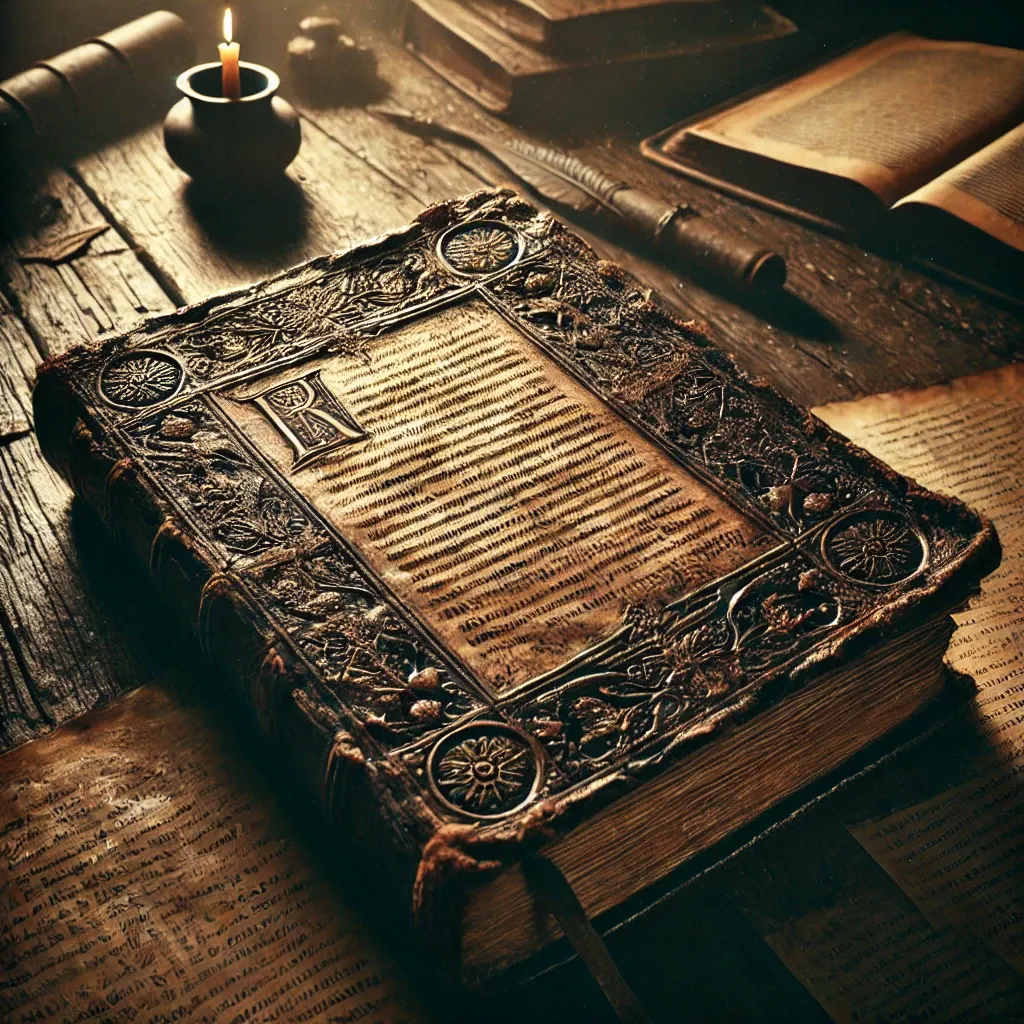
Professor Jeremy Hultin’s discussion on the Camp Gagnon podcast raised an essential question: why were certain ancient texts, like the Book of Enoch, the Gospel of Thomas, and the Gospel of Mary, excluded from the Bible? These texts, though considered sacred by some early Christian communities, were omitted from the canonical Bible largely due to their controversial content and potential to challenge established orthodoxy. Early Christian leaders, keen on consolidating their authority, sought to ensure that only certain teachings became widely accepted, often sidelining texts that offered alternative perspectives or threatened their control over doctrinal narratives.
The Book of Enoch, for instance, with its vivid accounts of angels (the Watchers) sharing forbidden knowledge, was perceived as too theologically complex and potentially destabilizing to the early Christian view of the divine order. Likewise, the Gospel of Thomas and Gospel of Mary presented versions of Jesus’s teachings and his relationships with followers that deviated from mainstream Christian thought, particularly in how they portrayed spiritual enlightenment and gender roles within early Christian communities.
The Role of Power and Control in Shaping the Bible
Who Wrote The Bible
It’s essential to recognize that the creation of the biblical canon was as much a political process as it was a religious one. As Christianity grew from a persecuted sect into an organized institution, the leaders of the early church needed to define a unified set of beliefs. This process culminated in the Council of Nicaea in 325 AD, where church leaders formally began to settle on which texts would be deemed authoritative. This effort to create a coherent doctrine meant excluding writings that might lead to dissent or alternative interpretations of the Christian faith.
The formation of the Bible was not just a spiritual endeavor—it was also a political one. In the early centuries of Christianity, church leaders faced the daunting task of unifying a fragmented movement. Different Christian sects interpreted Jesus’s teachings in various ways, and some texts, like the Gospel of Thomas, presented a version of Christianity that focused on personal spiritual enlightenment rather than centralized religious authority. The Council of Nicaea in 325 AD marked a turning point, where church leaders decided which texts would become part of the official canon. The books that offered alternative views—especially those that threatened the authority of the emerging church hierarchy—were left out, ensuring that future generations received a version of Christianity that supported the institution’s power.
The exclusion of these texts shows how those in power shape the narrative of history, particularly religious history. By omitting these books, early church leaders ensured that future generations would receive a version of Christianity that aligned with their vision of orthodoxy. The decision to suppress these alternative texts may have been driven by a fear that they could fragment the burgeoning Christian movement or introduce theological debates that would be difficult to control.

The Rise & Fall Of Rome
The Importance of Questioning Established Narratives
One of the most significant takeaways from Hultin’s discussion is that we should be mindful of the information we are given and the information that is hidden. Throughout history, powerful institutions—whether religious, governmental, or corporate—have often controlled knowledge, shaping what is considered acceptable or true. This is not just a relic of ancient times but a pattern that continues today. Questioning why certain narratives are promoted while others are silenced can lead to a more profound understanding of both history and modern society.
In our daily lives, this awareness can be applied in various ways. Whether it’s examining the media we consume, the histories we’re taught, or even the workplace hierarchies we navigate, it’s crucial to recognize that what is presented to us as “truth” may only be part of the story. Exploring alternative perspectives and challenging conventional wisdom allows us to make more informed decisions, both personally and socially.
The Dead Sea Scrolls – A Hidden Treasure of Knowledge
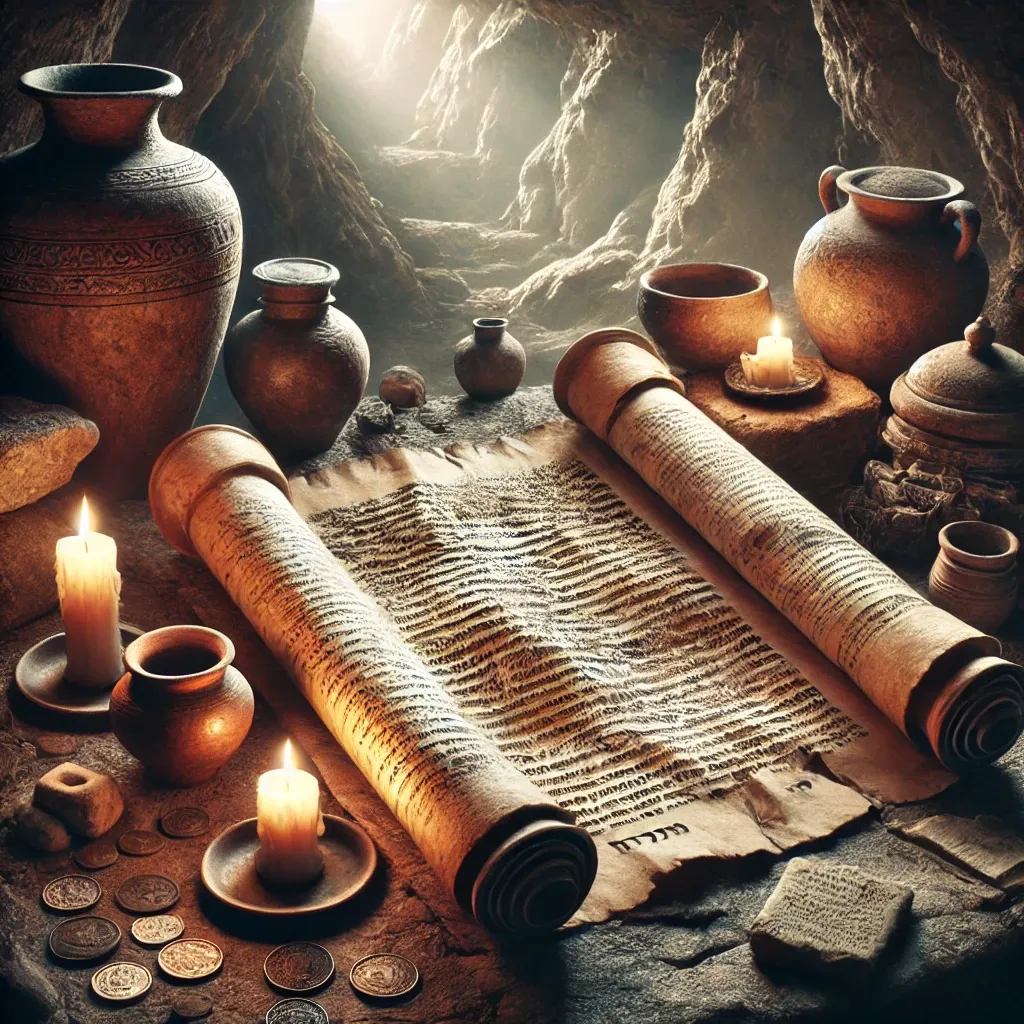
The discovery of the Dead Sea Scrolls in 1947 was a turning point for biblical scholars. Hidden for nearly 2,000 years in the caves of Qumran, these ancient texts provided a rare glimpse into early Jewish and Christian beliefs. Among them was the Book of Enoch, a text that had all but disappeared from Western religious traditions. The scrolls revealed the diversity of thought in early Judaism and Christianity, challenging the notion that the biblical canon had always been a unified whole. These hidden texts forced scholars to reconsider what we thought we knew about the formation of the Bible and early religious practices.
The Dead Sea Scrolls provide invaluable insight into early Jewish and Christian thought, revealing a much more diverse and complex religious landscape than the biblical canon suggests. These texts challenge our understanding of early religious practices, demonstrating that what we now consider “orthodox” Christianity was just one of many competing interpretations.
For instance, the Book of Enoch presents a worldview in which angels, not humans, are the primary transgressors, flipping the traditional narrative of sin and responsibility. Other texts found among the Dead Sea Scrolls, such as the War Scroll and the Community Rule, offer a glimpse into the apocalyptic and ascetic beliefs of the Qumran community, many of which did not make it into mainstream Jewish or Christian doctrine.
The discovery of these scrolls not only enriched our understanding of early religious history but also underscored the idea that much of history is waiting to be rediscovered by those willing to dig deeper. The Dead Sea Scrolls serve as a powerful reminder that the most valuable knowledge is sometimes hidden, waiting to be uncovered by those curious enough to question established narratives.
Dead Sea Scrolls
What Can We Learn From What Was Left Out?
The exclusion of the Book of Enoch, the Gospel of Thomas, and other ancient texts from the Bible is a reminder that the history of religion—and of knowledge in general—is not a straightforward path. By controlling which stories and ideas are preserved, those in power shape our understanding of the world. In questioning why certain knowledge is hidden or suppressed, we open ourselves up to a deeper and more complex view of history, one that acknowledges the diversity of thought and the role of power in shaping what we consider to be true.
In our modern world, the lessons from the excluded books of the Bible resonate more than ever. Whether in business, technology, or personal development, the ability to question established narratives is crucial. Just as early Christian leaders shaped what future generations would believe, so too do modern institutions shape the stories we accept as truth. By questioning those narratives—whether in corporate environments, political debates, or even media consumption—we can uncover hidden truths that might lead to greater wisdom, growth, and innovation.
The ancient texts excluded from the Bible remind us that the pursuit of knowledge, the exercise of power, and the interpretation of truth are complex and often politically driven. In a world filled with noise, we must ask ourselves: what stories are being left out, and why? As we navigate the challenges of modern life, from technological advancements to ethical dilemmas in leadership, we must remember the lessons of the past. Be curious, question the narratives presented to you, and always pair knowledge with wisdom. In doing so, you might uncover the hidden truths that lead to greater personal and societal success.
To truly uncover the hidden truths, we must actively seek out the stories, ideas, and knowledge that have been marginalized or suppressed. This journey requires both wisdom and resilience. As we continue to explore new frontiers—whether in technology, business, or personal life—we must carry with us the lessons of the past. By doing so, we build a future that is not only innovative but also grounded in ethical responsibility and deeper understanding.
The ultimate takeaway is clear: knowledge is powerful, but it is wisdom that ensures that power is used for good. In uncovering the hidden corners of history and challenging established narratives, we can unlock not only greater personal success but also a more ethical and enlightened society.
That's all I have for you today. I love you all. Thank you for being here and for supporting me the way you do. It means the world to me. Please share this with someone who you think could benefit from our community.
To The Week Ahead 🍻
With all my heart,
Your Friend, Austin ❤✌
You might be reading this but if you're not subscribed you could be missing out on exclusive content and other articles just like these. So please Leave a thumbs up, subscribe and i'll catch you on the next one! ✌🏻
Check Out All The Gear I Use For My Daily Journaling And WorkFlow
My Everyday Leather notebook Folio 📔
My Current Favorite Personal Journal 📚
The Every Day Carry Brass Pen 🖊️
How I listen to all my podcasts and books🎧
How I write all of the content I deliver to you beautiful people. 💻
Where I get all of my Audio Books 📚
Until Our Next Rendezvous
With all my heart,
Your Friend, Austin ❤✌
P.S. Many of you asked how you can help support this journaling movement, the most helpful thing you can do is leave a thumbs up 👍 leave a comment 💬 and share this post with your friends and family who might also find this topic interesting. Also Follow me on X formerly twitter @AmelioratingMan As this continues to grow I plan to add some kind of referral program to reward your support and I am also currently working behind the scenes on some exciting projects and giveaways for you all so stay tuned for that. Thank you all so much! Happy journaling! ♥
p. ps: I recently partnered with Amazon's affiliate program so any link provided on this post or any other place on my site that you may click on and make a purchase I will receive a small commission. I personally select what products are featured on here and I will never recommend anything I don't already use myself. Thank you all for the continued love and support.


